Introduction
Can Rabbits eat Turnip Greens? Let’s find out.
I’m here to share with you all the juicy details about incorporating turnip greens into your rabbit’s diet and how these leafy wonders can revolutionize their meals.
Picture this: a fluffy bunny, eyes wide with anticipation, nibbling on fresh, vibrant turnip greens. The crisp texture, the burst of flavors, and the incredible nutritional benefits make this a culinary experience like no other!
Turnip greens are an absolute powerhouse when it comes to providing your precious bunnies with essential vitamins and minerals.
From promoting healthy digestion to boosting their immune system, turnip greens are like nature’s secret weapon for keeping your furry pals in tip-top shape. We’ll dive into the nitty-gritty of the nutritional benefits and show you how these greens can be a game-changer for your rabbit’s overall well-being.
But that’s not all! We’ll also explore how to introduce turnip greens to your bunny’s diet, step by step.
So, grab a carrot and get ready for a wild ride as we unlock the mysteries of turnip greens and unleash a world of flavor, nutrition, and adventure for your adorable hopping companion. Let’s hop to it and give your bunny the mealtime extravaganza they deserve!
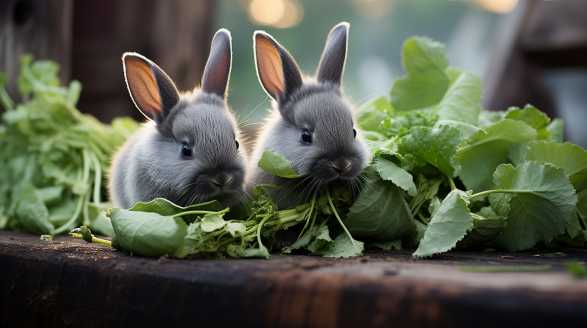
Key Takeaways
- Turnip greens are a nutritious and safe addition to a rabbit’s diet due to their high fiber content, vitamins, and minerals.
- Introduce turnip greens gradually to your rabbit’s diet, starting with small amounts and monitoring their response.
- Choose fresh and organic turnip greens, wash them thoroughly before serving, and remove any tough stems.
- Turnip greens provide benefits such as boosting immunity, promoting dental health, supporting digestion, and hydrating rabbits.
- It’s important to offer a diverse diet to rabbits, including other greens like kale and parsley, and to consult a veterinarian for specific dietary recommendations.
- Turnip greens can be introduced to young rabbits at around three months old, starting with small amounts and monitoring their digestive responses closely.
- Proper proportions and a balanced diet are important, and fruits and treats should be limited to prevent obesity and digestive issues in rabbits.
- Use tempting techniques and visual appeal to encourage young rabbits to try turnip greens, being patient and persistent in the process.
Turnip Greens vs. Other Leafy Greens: Which is Best for Rabbits?
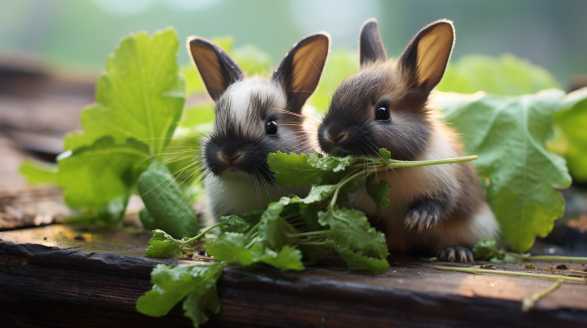
As an avid rabbit lover and owner, I have always been curious about the best leafy greens to feed my fluffy friends. It’s not always easy to determine which ones are the most beneficial for their health and well-being.
So, join me on this journey as I explore the world of turnip greens and other leafy greens for our adorable bunny companions!
Getting to Know Turnip Greens
Turnip greens, also known as Brassica rapa, are the leafy green tops of the turnip plant. They are packed with nutrients and have a mildly bitter taste that many rabbits find appealing.
In addition, they contain a good amount of fiber, which helps maintain a healthy digestive system for our furry friends.
The Nutritional Benefits of Turnip Greens
Turnip greens offer numerous health benefits for rabbits, making them a great addition to their diet. Here are some of the advantages turnip greens bring to the table:
- Vitamin A Boost: Vitamin A plays a vital role in maintaining good eyesight and promoting a sound immune system in rabbits. By including turnip greens in their diet, you provide them with an abundant source of this vital nutrient.
- Bone Health: Turnip greens are rich in vitamin K, which is crucial for maintaining strong bones in rabbits. This is especially important for younger bunnies who are still developing their skeletal structure.
- Healthy Skin and Coat: The high content of folate in turnip greens promotes healthy skin and a shiny coat, making your rabbit even more adorable!
- Fiber-Rich Delight: Turnip greens are a fantastic source of dietary fiber, aiding digestion and preventing issues like gastrointestinal stasis in rabbits.
Comparing Turnip Greens with Other Leafy Greens
Now that we have a good understanding of the nutritional benefits of turnip greens, let’s compare them to some other commonly available leafy greens and see how they stack up against one another:
Spinach
Spinach is often recommended as a nutritious leafy green for rabbits. While it offers various health benefits, it is important to note that the calcium content in spinach is relatively high.
Therefore, it is best to offer spinach in moderation and not as a staple food.
Kale
Kale is another leafy green that is commonly given to rabbits. It is a great source of vitamins A and C, as well as calcium and antioxidants.
Romaine Lettuce
Romaine lettuce is a popular choice among rabbit owners due to its crisp texture and mild taste. It is a low-calorie leafy green that rabbits can enjoy in moderate amounts.
Arugula
Arugula, with its peppery flavor, is an excellent choice for rabbits. It is low in calories, high in fiber, and packed with vitamins A, C, and K. Plus, arugula adds a delightful burst of flavor to your rabbit’s meal, making it a preferred leafy green for many bunny enthusiasts.
When in Doubt, Variety is Key!
While turnip greens offer a range of benefits for our rabbit friends, it is important to remember that a varied diet is crucial for their overall health. Including a mix of different leafy greens will ensure your rabbit receives a well-balanced and exciting meal every day.
- Cilantro
- Parsley
- Dill
- Red or green leaf lettuce
- Bok choy
By offering a variety of leafy greens in moderation, you can provide your rabbit with a diverse nutrient profile while keeping their meals interesting and exciting. Remember to introduce new greens gradually and observe how your bunny reacts to each variety to ensure they are not causing any digestive upset.
In the showdown of turnip greens versus other leafy greens, it’s clear that turnip greens have impressive nutritional benefits that make them excellent choices for your rabbit’s diet. However, moderation and variety are key to ensuring a well-rounded meal plan for your furry companion.
So why settle for boring when your rabbit’s plate can be bursting with flavor and vitality? Get creative and explore the world of leafy greens to keep your bunny hopping with joy!
Understanding Allergies and Sensitivities to Turnip Greens in Rabbits
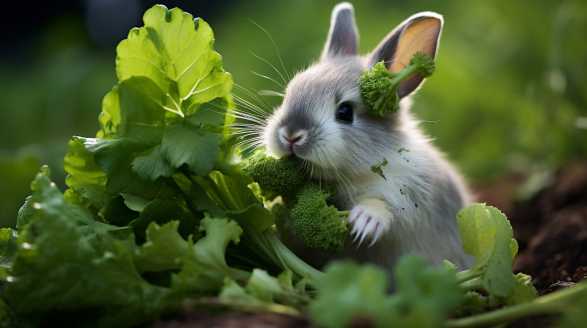
Being a rabbit owner can be an incredibly rewarding experience. These adorable little creatures bring joy and happiness into our lives, and it is our responsibility to ensure their health and well-being.
we will look into the fascinating world of rabbit allergies and sensitivities, specifically with regard to turnip greens. So, let’s dive in!
Allergies vs Sensitivities: What’s the Difference?
Before we explore turnip greens in depth, let’s first understand the distinction between allergies and sensitivities. Allergies involve an immune response triggered by a specific substance, while sensitivities are more of a digestive issue.
Common Symptoms of Allergies and Sensitivities in Rabbits
Recognizing the symptoms of allergies and sensitivities is crucial for ensuring the health of your rabbit. Keep an eye out for the following signs:
- Allergies:
- Excessive scratching or itching
- Runny nose and eyes
- Sneezing
- Swollen face, lips, or eyes
- Difficulty breathing
- Sensitivities:
- Diarrhea or loose stools
- Lack of appetite
- Abdominal discomfort
- Flatulence
- General lethargy
If you notice any of these symptoms after introducing turnip greens to your rabbit’s diet, it is essential to take action promptly.
Turnip Greens and Rabbit Allergies: An Unexpected Connection
Turnip greens are a popular leafy green vegetable that many rabbit owners include in their pets’ diet. However, despite being rich in nutritional value, turnip greens can occasionally cause allergies in rabbits.
In fact, turnip greens are part of a larger group of vegetables called the brassica family, which also includes cabbage, broccoli, and kale. This family tends to induce allergies more frequently.
Why Turnip Greens May Cause Allergic Reactions in Rabbits
The exact reason behind rabbit allergies to turnip greens is still being studied, but researchers believe that a compound called thiocyanate may play a role. Thiocyanates can inhibit iodine uptake in the thyroid gland, leading to potential thyroid issues in rabbits.
Dealing with Allergies and Sensitivities: Prevention and Care
Now that we know about the potential risks of turnip greens for rabbits, let’s discuss how we can prevent and manage allergies and sensitivities. Here are some helpful tips:
- ## Prevention is Key:
- Gradual Introduction: If you want to include turnip greens in your rabbit’s diet, start with small amounts and gradually increase them over time. This helps their digestive system adjust to the new food.
- Variety is Important: A diverse diet is essential for a healthy rabbit. Instead of solely relying on turnip greens, incorporate a range of vegetables to minimize the likelihood of developing allergies or sensitivities.
- ### Monitor Their Reactions:
- Observe Carefully: When introducing turnip greens, closely observe your rabbit’s behavior and monitor any physical symptoms. This allows you to spot potential allergies or sensitivities early on.
- Keep a Journal: Maintain a journal noting the foods your rabbit consumes and any reactions they exhibit. This record can help identify patterns and determine problem foods.
- ### Seek Veterinary Advice:
- Consultation is Vital: If you suspect an allergy or sensitivity, never hesitate to seek veterinary assistance. A professional will provide a definitive diagnosis and prescribe appropriate treatment.
- ### Treatment Options:
- Allergen Removal: If an allergy is confirmed, removing the problematic food from your rabbit’s diet is essential. Find suitable alternative vegetables to maintain a balanced diet.
- Medications: In severe cases, your vet may prescribe medications to alleviate symptoms or manage underlying conditions.
Understanding your rabbit’s allergies and sensitivities is crucial for their overall well-being. While turnip greens are generally considered a healthy addition to a rabbit’s diet, some rabbits may develop allergies or sensitivities to this leafy green.
Remember, prevention and veterinary care are key when it comes to managing allergies and sensitivities in rabbits. So, let’s keep our bunnies happy, healthy, and allergy-free!
Rabbit-Approved Recipes: Delicious Turnip Greens Treats
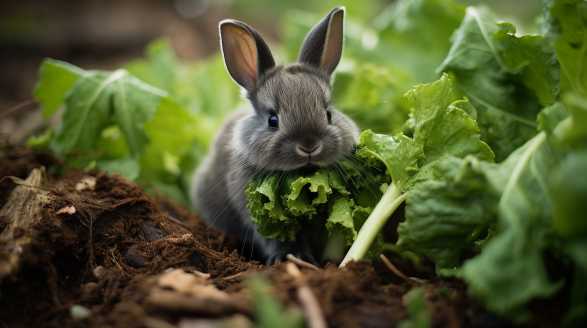
Hey there, fellow bunny lovers! Are you looking for new and exciting ways to spoil your furry friends?
Today, I’ll be sharing with you some delicious turnip greens treats that are bound to make your bunnies hop with excitement. So, grab your apron and let’s dive into the magical world of rabbit-approved recipes!
Why Turnip Greens?
Nutritional Goodness of Turnip Greens
Turnip greens are an incredibly nutritious leafy vegetable that packs a punch when it comes to vitamins and minerals. These leafy wonders are chock-full of vitamin A, vitamin K, vitamin C, and calcium.
Incorporating turnip greens into your rabbit’s diet can help support their overall health and well-being.
Recipe 1: Turnip Green Delight Salad
Ingredients:
- 2 cups finely chopped turnip greens
- 1/2 cup grated carrot
- 1/2 cup diced cucumber
- 1/4 cup sliced radishes
- 1/4 cup fresh parsley leaves
Instructions:
- In a large bowl, combine turnip greens, grated carrot, cucumber, radishes, and parsley leaves.
- Toss gently to mix all the ingredients well.
- Serve this refreshing salad to your bunny as a delightful snack.
Recipe 2: Baked Turnip Green Chips
Ingredients:
- 1 bunch of turnip greens
- Olive oil spray
- Salt to taste
- Optional: dried herbs like paprika, thyme, or rosemary
Instructions:
- Preheat your oven to 350°F (175°C).
- Wash and thoroughly dry the turnip greens.
- Tear the turnip greens into bite-sized pieces and spread them evenly on a baking sheet.
- Lightly spray the turnip greens with olive oil and sprinkle salt (and dried herbs, if desired) evenly over them.
- Bake for 10-15 minutes, or until the edges are slightly browned and crispy.
- Let the chips cool completely before serving to your bunny.
Recipe 3: Turnip Green Bunny Smoothie
Ingredients:
- 1 cup turnip greens
- 1/2 cup chopped pineapple
- 1/2 cup sliced banana
- 1/4 cup water (adjust as necessary)
- Optional: a small handful of fresh mint leaves for added freshness
Instructions:
- In a blender, combine turnip greens, chopped pineapple, sliced banana, and water.
- Blend until you reach a smooth consistency.
- If adding mint leaves, toss them into the blender and pulse a few times to incorporate. Don’t overblend, as the mint leaves are best left slightly chunky.
- Pour the refreshing smoothie into a bowl or dish and let your furry friend lap up the goodness.
Recipe 4: Turnip Green Hay Stack
Ingredients:
- Fresh turnip greens (stems removed)
- Hay (high-quality hay preferred)
Instructions:
- Spread a layer of hay at the bottom of your rabbit’s enclosure, ensuring it covers the entire floor area.
- Place a generous layer of fresh turnip greens on top of the hay.
- Repeat the hay and turnip green layers until you have a stack of goodness for your bunny to enjoy.
- Watch your rabbit happily nibble away at this hay stack treat!
Congratulations, bunny lovers! You now have a bevy of rabbit-approved recipes featuring delicious turnip greens treats.
Remember to always introduce new foods gradually and consult with your veterinarian if you have any concerns about your rabbit’s dietary needs. So, hop to it and share these delightful recipes with your furry friends.
The Digestive System of Rabbits and How Turnip Greens Aid It
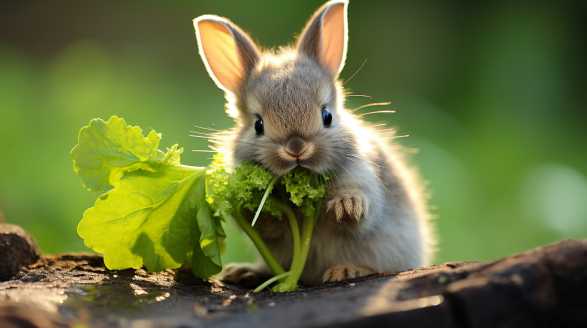
As a curious individual with a penchant for all things fluffy and adorable, I recently found myself pondering the intricacies of a rabbit’s digestive system. How do these adorable little creatures process their food?
Join me on this fascinating journey into the world of rabbits and their digestive marvels.
Understanding the Digestive System of Rabbits
Rabbits are herbivores, meaning they exclusively feed on plant material. Their digestive system is uniquely adapted to extract maximum nutrition from the fibrous vegetation they consume.
1. The Marathon of Munching
When it comes to chewing, rabbits are the true champions. Their digestive journey begins as they munch voraciously on fibrous plant material, such as turnip greens.
2. The Front Line of Defense
Within a rabbit’s mouth lies a set of ever-growing incisors perfectly designed for slicing through vegetation. These sharp teeth work together with the molars situated at the rear of the mouth to break down the food into smaller, more manageable pieces.
3. The Journey to the Bottomless Pit
From the mouth, the chewed food, also known as bolus, makes its way down the esophagus via a series of rhythmic contractions called peristalsis. This highway to the stomach allows for a smooth and uninterrupted descent of the bolus.
4. The All-Important Stomach
Rabbits possess a unique digestive organ called the cecum. This structure is responsible for breaking down the tough cellulose fibers present in plant material.
These regions work in harmony to provide the optimal environment for digestion.
The Role of Turnip Greens in a Rabbit’s Digestive Health
Now that we’ve laid the groundwork for understanding the rabbit’s digestive system, let’s dive into the fantastic benefits turnip greens offer to aid in digestion:
1. Fiber Superstars
Turnip greens are packed with fiber, a crucial component in a rabbit’s diet. This fibrous content helps promote regular bowel movements and keeps the digestive system functioning smoothly.
2. Nutritional Powerhouses
These vibrant green leaves are a treasure trove of vitamins and minerals essential for a rabbit’s well-being. They contain high amounts of vitamin A, vitamin K, vitamin C, and calcium, to name just a few.
3. Hydration Heroes
Rabbits can be notorious for not consuming enough water, leading to potential dehydration issues. Turnip greens consist of a significant water content, helping to keep our fluffy friends hydrated and their digestive system running smoothly.
Tips for Incorporating Turnip Greens into Your Rabbit’s Diet
Now that you’re aware of the incredible benefits provided by turnip greens, here are some practical tips for introducing this fantastic dietary addition into your precious bunny’s life:
When introducing any new food to your rabbit’s diet, including turnip greens, it is essential to do so gradually. Start by offering small amounts and monitor your rabbit’s reaction.
2. Fresh and Organic
Always aim for fresh and organic turnip greens. This will guarantee that your furry friend receives the maximum nutritional benefits without any harmful additives or pesticides.
3. Moderation is Key
While turnip greens are indeed a wonderful addition to a rabbit’s diet, moderation is key. Remember that rabbits have sensitive digestive systems, so excessive consumption of any food, including turnip greens, can cause digestive upset.
The digestive system of rabbits is a marvel to behold, perfectly designed to process the fibrous plant material they consume. Turnip greens, with their fiber, nutrients, and hydrating properties, offer a fantastic aid to their digestive health.
So, next time you find yourself indulging in the joy of watching a nibbling bunny, remember the importance of turnip greens in supporting their digestive system – truly nature’s superfood for these fluffy marvels!
The Dos and Don’ts of Introducing Turnip Greens to Your Rabbit
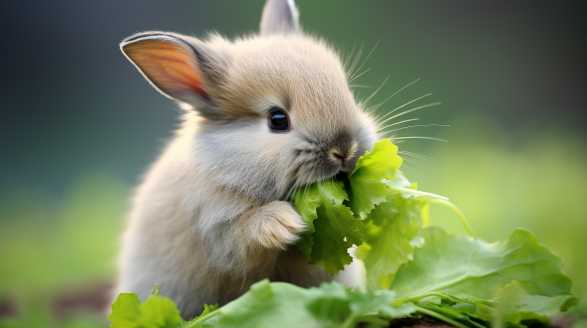
As a rabbit owner, you want to provide your furry friend with a nutritious and varied diet. One great addition to your rabbit’s food repertoire is turnip greens.
However, it’s important to introduce new foods slowly and with caution. I will share some dos and don’ts to ensure a smooth transition to turnip greens for your beloved bunny.
Why Choose Turnip Greens for Your Rabbit?
Turnip greens not only add variety to your rabbit’s diet but also offer several health benefits. They are an excellent source of fiber, which promotes healthy digestion and reduces the risk of gastrointestinal problems.
By incorporating these greens into your rabbit’s diet, you can enhance their overall well-being.
Do’s for Introducing Turnip Greens to Your Rabbit
- Start small: Begin by offering a small amount of turnip greens as a treat alongside your rabbit’s regular diet. Monitor their response to ensure they tolerate the new food well.
- Gradually increase quantity: Over time, gradually increase the amount of turnip greens you provide to your rabbit. This allows their digestive system to adapt and avoids any sudden upsets.
- Introduce one new food at a time: If you’re introducing other vegetables or greens to your rabbit, do it one at a time. This way, you can pinpoint any food-related issues and identify which foods agree best with your rabbit.
- Wash thoroughly: Before serving turnip greens to your rabbit, make sure to wash them thoroughly to remove any dirt, pesticides, or chemicals that may be harmful. Your rabbit’s health and safety should always be your top priority.
- Serve fresh: Only offer fresh turnip greens to your rabbit. Old or wilted greens can upset their stomach and may be less nutritious.
- Monitor bowel movements: Keep an eye on your rabbit’s droppings when introducing turnip greens. Any significant changes in quantity or consistency may indicate a negative reaction. If you notice anything abnormal, consult your veterinarian.
Don’ts for Introducing Turnip Greens to Your Rabbit
- Don’t force-feed: Never force your rabbit to eat turnip greens. Rabbits are selective eaters, and it may take time for them to develop a taste for new foods. Be patient and let them explore at their own pace.
- Avoid overfeeding: While turnip greens provide many benefits, overfeeding any one food can upset your rabbit’s delicate digestive system. Moderation is key.
- Avoid using pesticides: When growing your own turnip greens, opt for organic methods and avoid using pesticides or insecticides that can harm your rabbit’s health.
- Don’t mix all new foods together: While introducing new foods, such as turnip greens, avoid mixing them with other unfamiliar foods. This way, you can easily identify any adverse reactions specific to the new food.
- Avoid sudden diet changes: Rapidly transitioning your rabbit’s diet can lead to digestive troubles. Instead, gradually introduce turnip greens alongside their existing diet.
- Don’t skip observation: Keep a keen eye on your rabbit’s behavior, appetite, and any physical changes when introducing turnip greens. Early detection of any problems can prevent more significant health issues down the line.
Introducing turnip greens to your rabbit can be a positive step towards providing them with a diverse and nutritious diet. Follow these dos and don’ts to ensure a successful transition.
By taking the time to introduce this leafy green correctly, you’re contributing to the overall well-being and happiness of your furry friend.
Turnip Greens: A Natural Supplement for Vitamin-Rich Rabbit Diet
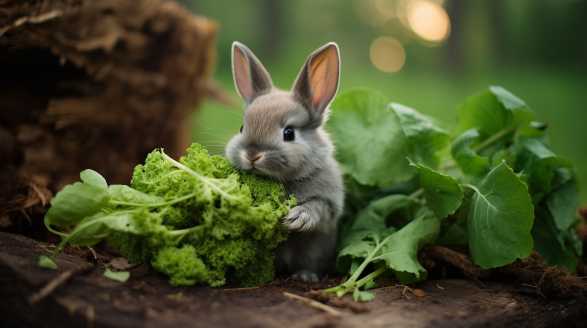
Hey there, fellow rabbit lovers! Today, I am here to discuss an exciting topic that will surely make your bunnies’ ears perk up with delight – Turnip Greens: A Natural Supplement for Vitamin-Rich Rabbit Diet.
Join me as we uncover the wonders of this leafy green vegetable and how it can take your rabbit’s diet to the next level!
Why Turnip Greens?
You may be wondering, “Why turnip greens specifically? Aren’t there other veggies out there for rabbits?” Well, my curious friends, turnip greens hold a special place in the rabbit kingdom.
- Packed with Vitamins – Turnip greens are exceptionally rich in vitamins A, B6, C, and K. These essential vitamins work wonders for your rabbit’s overall wellbeing, ensuring a healthy immune system and proper development.
- Mineral Magic – Alongside vitamins, turnip greens offer an abundance of vital minerals such as calcium, potassium, and magnesium. These minerals contribute to strong bones and teeth, healthy muscle function, and balanced electrolyte levels.
- Low Calories, High Fiber – For those of you concerned about your rabbit’s weight management, turnip greens are a guilt-free delight. These greens are low in calories but high in fiber, aiding in digestion and preventing any unwanted fluffiness.
Preparing and Serving Turnip Greens
Excited to get started? I can assure you, your bunnies will be too!
Take a look:
- Freshness Matters – Always opt for fresh turnip greens that are crispy, vibrant green, and free from wilting. Remember, fresher is always better for your rabbit’s overall health.
- Cleanse and Rinse – Before serving the turnip greens, make sure to thoroughly cleanse and rinse them to remove any dirt, pesticides, or chemicals that may be harmful to your beloved rabbits.
- Chop It Up! – While some bunnies enjoy munching on whole leaves, others prefer smaller bite-sized pieces. Take your rabbit’s preference into consideration and chop the turnip greens accordingly for easy consumption.
- Introduce Slowly – If your rabbits are new to turnip greens, introduce them gradually. Start with small amounts initially and monitor their digestive response. You don’t want any tummy troubles!
The Benefits Unleashed
Let’s dig deeper and explore the incredible benefits turnip greens offer to our fluffy companions:
Boosting Immunity
The high concentration of vitamins in turnip greens serves as a fantastic booster for your rabbit’s immune system. A healthy immune system ensures your bunnies stay active, vibrant, and well-equipped to fight off any potential illnesses.
Promoting Dental Health
Rabbits’ constant teeth growth can sometimes cause dental issues. However, chewing on turnip greens helps wear down their teeth naturally.
Supporting Healthy Digestion
Fiber is essential for a rabbit’s digestive system, and turnip greens offer an abundance of it! This fiber-rich goodness aids in proper digestion, prevents gastrointestinal issues, and keeps your bunnies hopping happily.
Hydrating Power
Keeping your rabbits hydrated is crucial, and turnip greens can help with that too! This leafy veggie has a high water content, which can supplement your bunnies’ hydration needs, especially during warmer months.
Eye Health and Vision
Vitamin A, abundantly found in turnip greens, is known for its positive impact on eye health. Including turnip greens in your rabbit’s diet helps maintain optimal eye health, ensuring their vision stays as sharp as ever.
Energy Boost
Turnip greens are not only nutrient-dense but also provide a natural energy boost to your bunnies. The vitamins, minerals, and fiber work in harmony to keep your rabbits lively and energized throughout the day, ready for those playful hops!
Congratulations, rabbit enthusiasts, you are now well-versed in the wonders of turnip greens as a natural supplement for your bunny’s vitamin-rich diet! Remember, incorporating turnip greens into your rabbits’ daily meals can provide a multitude of benefits, including immunity boost, dental health promotion, digestive support, hydration, improved vision, and a burst of energy.
So, why wait? Head over to your local market, grab some fresh turnip greens, and watch your furry friends squeal with joy as they chomp away on these leafy wonders.
Happy munching, folks!
How to Properly Prepare Turnip Greens for Your Rabbit’s Diet
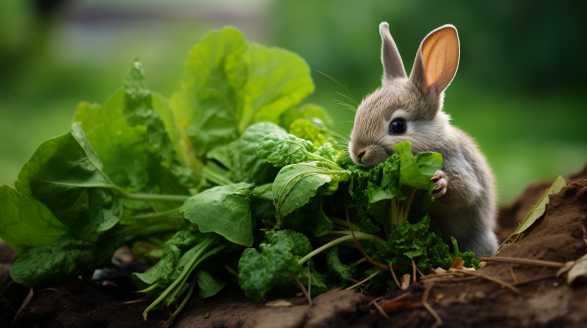
As a rabbit owner, I understand the importance of providing a balanced and nutritious diet for our furry friends. While hay is an essential part of their diet, adding fresh vegetables like turnip greens can provide them with a variety of nutrients.
I will guide you through the process of preparing turnip greens for your rabbit’s diet, step by step.
Why Turnip Greens?
Turnip greens are a fantastic addition to a rabbit’s diet due to their high nutritional value. They are a great source of vitamins A, C, and K, as well as minerals like calcium, iron, and folate.
Preparing Turnip Greens – Step by Step Guide
To ensure your rabbit receives the maximum benefits from turnip greens, follow these simple steps to prepare them:
- Select Fresh and Organic Greens: Always choose fresh, organic turnip greens to avoid any pesticides or contamination. Fresher greens also offer better taste and nutritional value to your rabbit.
- Wash Thoroughly: Take the turnip greens and rinse them under cool running water. Ensure that you remove any dirt, debris, or pests. It is essential to clean them properly to prevent any health issues for your furry friend.
- Remove the Stems: Rabbits might find it challenging to chew and digest the tough stems of turnip greens. Hence, it is recommended to remove the stems before serving. You can either cut them off or separate the leaves from the stems manually.
- Cut into Bite-sized Pieces: After removing the stems, slice the turnip greens into bite-sized pieces. Rabbits prefer smaller pieces as they are easier to chew and consume. Plus, it prevents them from gulping down large chunks, promoting better digestion.
- Introduce Gradually: It’s crucial to introduce new foods gradually to your rabbit’s diet. Start by offering a small amount of turnip greens and observe their response. If they tolerate them well, you can increase the quantity over time.
- Rotate with Other Vegetables: While turnip greens are an excellent option, it is essential to offer a variety of vegetables to provide a well-rounded diet. Rotate turnip greens with other greens like kale, spinach, or lettuce to ensure a diverse and exciting mealtime experience for your rabbit.
Tips for Serving Turnip Greens
When it comes to serving turnip greens to your rabbit, there are a few additional tips to keep in mind:
Offer Freshly Prepared Greens Daily
Rabbits thrive on fresh food, so it is recommended to serve them freshly prepared turnip greens daily. This ensures they receive the maximum nutritional benefits and enjoy the best taste possible.
Break up Monotony with Creative Presentation
Rabbits, like humans, appreciate variety. You can keep your rabbit excited about their meals by presenting turnip greens in different ways.
Monitor Your Rabbit’s Response
Each rabbit’s digestive system is unique, and it’s essential to monitor their response when introducing new foods. Watch for any signs of digestive discomfort, such as bloating or diarrhea.
Integrate with Hay and Pellets
Turnip greens should be seen as a supplementary food and not a replacement for hay or pellets. Hay provides essential fiber, and pellets offer additional nutrients, so make sure to integrate turnip greens into your rabbit’s diet alongside these staple foods.
Avoid Use of Pesticides or Chemicals
When sourcing turnip greens, ensure they are free from any pesticides or chemicals. Prolonged exposure to such substances can harm rabbits.
Incorporating turnip greens into your rabbit’s diet can provide them with a range of important nutrients while adding excitement to their meals. By following the simple steps outlined in this guide and keeping safety precautions in mind, you can ensure your rabbit enjoys a well-balanced diet.
Your furry friend will thank you with their hops of joy!
The Nutritional Benefits of Turnip Greens for Rabbits
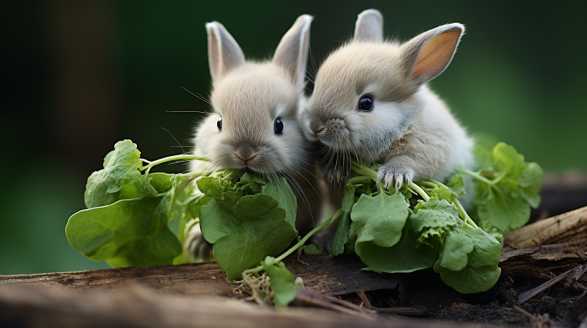
Hey there, my fellow rabbit lovers and enthusiasts! Today, I am beyond excited to look into a topic that is often overlooked but holds immense importance for our furry friends – the nutritional benefits of turnip greens for rabbits.
So, grab a carrot and let’s hop right into it!
Why Turnip Greens?
You might be wondering, why turnip greens? Well, my friends, turnip greens are an excellent choice for your rabbits due to their incredible nutritional composition.
Plus, they offer a delicious alternative to the usual rabbit fare, adding variety and excitement to your furball’s diet.
A Burst of Vitamins
When it comes to vitamins, turnip greens are a nutrient powerhouse. They contain an array of essential vitamins, including:
- Vitamin A: Turnip greens are rich in vitamin A, which is vital for maintaining healthy eyesight, supporting immune function, and promoting cell growth and development.
- Vitamin K: Turnip greens are an excellent natural source of vitamin K, which plays a crucial role in blood clotting, bone health, and even brain function.
- Vitamin C: These leafy greens provide a decent amount of vitamin C, boosting your rabbit’s immune system and aiding in collagen production for healthy skin and connective tissues.
- B Vitamins: Turnip greens contain an assortment of B vitamins, such as thiamin, riboflavin, niacin, and folate, which are essential for metabolism and overall cellular function.
A Nutritional Feast
Apart from their vitamin content, turnip greens are bursting with an impressive range of minerals necessary for your furry friend’s well-being. They include:
- Calcium: Turnip greens are a fantastic source of calcium, vital for maintaining strong bones and teeth in rabbits.
- Iron: Iron, found abundantly in turnip greens, is crucial for the production of red blood cells, ensuring proper oxygen transportation throughout your bunny’s body.
- Potassium: Turnip greens offer a generous amount of potassium, an essential mineral that supports heart health, regulates blood pressure, and aids in proper muscle function.
- Magnesium: Magnesium, found in turnip greens, helps maintain normal nerve and muscle function, supports a healthy immune system, and even contributes to stable blood sugar levels.
High Fiber Delight
One of the most significant benefits of turnip greens for rabbits lies in their high fiber content. Fiber is essential for maintaining a healthy digestive system and preventing issues like gastrointestinal stasis, which can be life-threatening for our furry friends.
How to Incorporate Turnip Greens into Your Rabbit’s Diet
Now that we’ve established the fantastic nutritional benefits of turnip greens for rabbits, it’s important to know how to introduce them into your furball’s diet. Here are a few tips to get you started:
- Gradual Introduction: Start by introducing small amounts of turnip greens alongside your rabbit’s regular diet to allow their digestive system to adjust gradually.
- Fresh and Organic: Always opt for fresh, organic turnip greens to ensure maximum nutritional value and avoid any potential chemicals or pesticides.
- Limit Amounts: While turnip greens are undoubtedly nutritious, they should still be fed in moderation. Aim for providing a few leaves a couple of times a week to prevent overeating and potential digestive issues.
- Watch for Allergies: Just like humans, rabbits can have allergies too! Observe your rabbit closely for any adverse reactions after introducing turnip greens, such as diarrhea or changes in behavior. If you notice any negative effects, consult your veterinarian.
- Variety is Key: Remember that turnip greens should be a part of a varied diet. Incorporate other leafy greens, fresh veggies, and hay to provide a balanced and exciting diet for your rabbit.
Well, my bunny-loving pals, we have taken a wild and journey into the world of turnip greens and their impressive nutritional benefits for rabbits. From the blast of vitamins to the burst of minerals and the fiber-filled delight, turnip greens are indeed a fantastic addition to your bunny’s diet.
Are Turnip Greens Safe for Rabbits? Everything You Need to Know
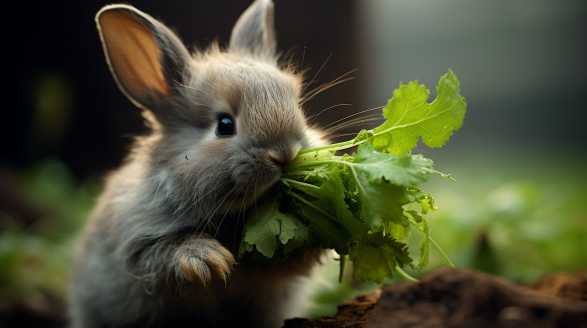
When it comes to feeding our furry friends, like rabbits, it’s essential to choose their diet wisely. The question that often arises in the rabbit-owning community is whether turnip greens are safe for these adorable creatures or not.
What Are Turnip Greens?
Let’s start by understanding what exactly turnip greens are. Turnip greens are the leafy green tops of the turnip plant.
The Nutritional Benefits
Rabbits thrive on a fiber-rich, low-calorie diet, and turnip greens fit the bill perfectly. Here are some of the nutrients you can find in turnip greens:
- Fiber: Fiber is crucial for a rabbit’s digestive health. Turnip greens are an excellent source of fiber, ensuring proper digestion and preventing gastrointestinal issues.
- Vitamins: Turnip greens are rich in vitamins like vitamin A, vitamin C, and vitamin K. These vitamins contribute to your rabbit’s overall well-being and help strengthen their immune system.
- Minerals: Minerals such as calcium, iron, and potassium are also found in turnip greens. These minerals are essential for maintaining healthy bones, promoting blood health, and aiding in various bodily functions.
How to Introduce Turnip Greens to Your Rabbit’s Diet
When introducing any new food to your rabbit, it’s crucial to do so gradually. Rabbits have sensitive digestive systems, and sudden changes in their diet can cause digestive upset.
- Start with small amounts: Begin by offering a small amount of turnip greens to your rabbit. Monitor their reaction closely to ensure they tolerate it well.
- Observe for any adverse effects: Keep an eye out for any signs of digestive issues like diarrhea or bloating. If your rabbit experiences any adverse effects, discontinue feeding them turnip greens.
- Gradually increase the portions: If your rabbit tolerates turnip greens well, gradually increase the amount over a few days to ensure their digestive system adapts smoothly.
Some Precautions to Consider
While turnip greens can be a healthy addition to your rabbit’s diet, there are a few precautions you should keep in mind:
Avoid feeding turnip greens in excess:
Like any other food, turnip greens should be given in moderation. Excessive consumption of turnip greens can cause gas build-up and digestive issues.
What Parts of Turnips Can Rabbits Eat?
When it comes to rabbits, they can enjoy not only the nutritious turnip greens but also other parts of this root vegetable. Here’s a breakdown of what parts of turnips are safe for rabbits:
- Turnip Roots: The actual turnip vegetable can be fed to your rabbit as a treat occasionally. However, be sure to offer small amounts as it is relatively high in sugar and can contribute to weight gain or other health issues if given excessively.
- Turnip Tops/Greens: As discussed earlier, the leafy green tops of the turnip plant are packed with essential nutrients and make a healthy addition to your rabbit’s diet.
Other Greens for Rabbits
While turnip greens are safe for rabbits, it’s always great to introduce variety into their diet. Here are some other safe and nutritious greens you can offer your beloved bunny:
- Kale: Kale is an excellent source of vitamins and minerals. However, moderation is key, as kale is high in calcium and should be given sparingly to prevent urinary issues.
- Spinach: Spinach is loaded with nutrients and can be a part of your rabbit’s diet. However, it should be fed in moderation due to its high oxalic acid content, which can interfere with the absorption of calcium.
- Cilantro: Cilantro is a flavorful herb that rabbits enjoy. It provides an extra dash of taste to their meals while offering various health benefits.
Turnip greens can be a safe and nutritious addition to your rabbit’s diet. These fiber-rich greens provide essential vitamins and minerals that contribute to your rabbit’s overall well-being.
Additionally, don’t forget to mix up their diet with other bunny-approved greens for optimal health and variety. So, go ahead and treat your adorable little friend to some delicious turnip greens!
Step-by-Step Guide to Introducing Turnip Greens to Young Rabbits
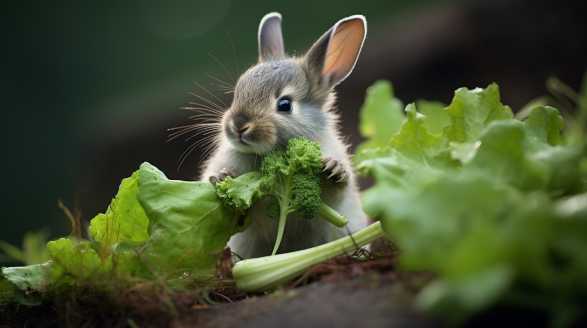
As a passionate rabbit enthusiast, I have discovered a fantastic way to ensure a healthy diet for young rabbits – introducing them to delicious turnip greens! I know it may sound like a daunting task, but fear not!
So, let’s dive in and get those adorable furballs munching on some greens!
Why Turnip Greens?
Before we jump into the details, let me explain why turnip greens are an excellent addition to a young rabbit’s diet. Turnip greens are rich in vitamins A, C, and K, as well as essential minerals like calcium and potassium.
Plus, they offer some variety to your rabbit’s regular meals, keeping them excited and interested.
1. Consult a Veterinarian
It’s essential to consult a veterinarian before altering your rabbit’s diet. They can provide valuable insights based on the specific needs of your rabbit’s breed and age.
2. Choose Fresh and Organic Turnip Greens
When selecting turnip greens, opt for fresh, organic options. Avoid greens that are wilted, discolored, or have signs of mold.
3. Wash Thoroughly
Wash the turnip greens thoroughly to eliminate any dirt or pesticides. This step ensures your furry friend’s safety, protecting them from potential digestive issues.
1. Age Matters
Usually, it is recommended to introduce turnip greens to rabbits aged three months or older. Younger rabbits might have a more sensitive digestive system, requiring a gentler transition.
2. Start with Small Amounts
Begin by offering a small amount of turnip greens, about the size of a rabbit’s ear, and observe their response. A gradual approach helps rabbits adjust to the new food without overwhelming their delicate digestive system.
3. Monitor Digestive Responses
Observe your young rabbit closely after introducing turnip greens. Look out for any signs of stomach upset, such as decreased appetite, diarrhea, or changes in droppings.
Establishing a Balanced Diet
1. Proper Proportions
The diet of a young rabbit should mainly consist of hay, supplemented with fresh vegetables like turnip greens. Ensure that for every pound of the rabbit’s body weight, they receive a generous serving of fresh greens.
2. Diversify the Diet
While turnip greens are highly beneficial, it’s crucial to offer a varied diet to meet all nutritional needs. Incorporate other leafy greens, such as kale or parsley, to provide a diverse range of nutrients.
3. Limit Fruits and Treats
Rabbits have a sweet tooth, but excessive fruit consumption can lead to obesity and digestive issues. Limit fruit treats to occasional small portions and focus on a primarily herbal and leafy green-based diet.
Introducing Turnip Greens
1. Patient Persistence
Rabbits can be picky eaters initially. Don’t be discouraged if they take some time to warm up to turnip greens.
Keep offering small amounts consistently until your furry friend recognizes and enjoys the greens.
2. Tempting Techniques
Try enticing your young rabbit with turnip greens in different ways. For a fun twist, wrap a small portion inside a hay bundle or mix the greens with their regular pellet feed.
3. Visual Appeal
As we know, rabbits love to explore new things visually. Show them that the turnip greens are delicious by holding them close to the rabbit’s face.
Congratulations! You are now equipped with a comprehensive step-by-step guide to introducing turnip greens to young rabbits.
By incorporating turnip greens into your young rabbit’s diet, you promote their overall health and create a captivating culinary experience for your furry friend. So, don’t wait any longer – let the turnip greens adventure begin!

Conclusion
Wow, what a journey we’ve had exploring the world of turnip greens and their benefits for our darling rabbits! From their fantastic nutritional profile to the step-by-step guide on introducing them to your fluffy companions, we’ve covered it all.
We’ve unlocked the secrets of ensuring their safety and managing allergies or sensitivities, learned how to prepare delectable turnip green treats that will have your bunnies begging for more, and even discovered the wonders of turnip greens on your rabbit’s digestive system. It’s safe to say that turnip greens have transformed mealtime into an exciting adventure for you and your furry friends!
So, let me leave you with this final thought: by incorporating turnip greens into your rabbit’s meals, you’re not only providing them with a nutritious and balanced diet but also adding excitement and variety to their daily routine. Who knew that such a simple leafy green could have such a profound impact on your bunny’s health and happiness?
Remember, every bunny is unique, so be patient and persist in finding the perfect way to introduce turnip greens to your furry friend. And don’t forget to consult with a veterinarian to ensure you’re meeting their specific dietary needs.
So, go ahead – whip up some turnip green treats, watch as your bunny dives into a mountain of fresh greens, and bask in the satisfaction of knowing you’re providing them with the best possible diet. Let’s keep those little tails wagging and those noses twitching as we continue to explore the amazing world of rabbit nutrition.
Frequently Asked Questions
Can rabbits eat turnip greens?
Yes, rabbits can eat turnip greens. They are safe and healthy for them to consume in moderation.
What are the nutritional benefits of turnip greens for rabbits?
Turnip greens are rich in nutrients such as calcium, vitamin C, vitamin K, and fiber. They can contribute to a well-balanced diet for rabbits.
How should I prepare turnip greens for my rabbit?
Before feeding turnip greens to your rabbit, make sure to wash them thoroughly to remove any dirt or pesticides. You can then serve them raw or lightly steamed.
How much turnip greens should I feed my rabbit?
Turnip greens should be given as part of a varied diet. Offer them to your rabbit in small portions, about a handful per day, along with other vegetables and hay.
Are there any risks or precautions to consider when feeding turnip greens to rabbits?
While turnip greens are generally safe for rabbits, they should be fed in moderation. Excessive consumption may cause digestive issues or diarrhea.
Can rabbits eat turnip greens from the store?
Yes, rabbits can eat turnip greens purchased from the store as long as they are fresh and free from any additives or preservatives. Avoid wilted or spoiled greens.
Are there any alternatives to turnip greens that rabbits can eat?
Yes, rabbits can also enjoy a variety of leafy green vegetables such as kale, spinach, and romaine lettuce. It’s important to offer a diverse range of greens to ensure a balanced diet for your rabbit.
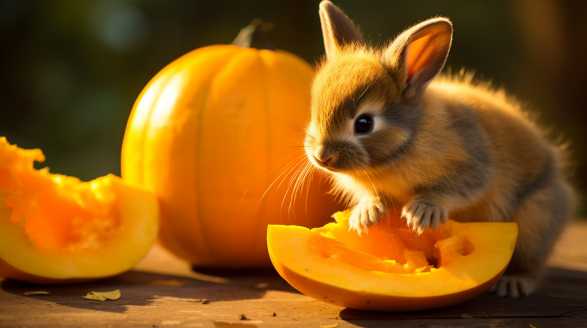
Can Rabbits Eat Squash
Introduction Today, I am eager to share some groundbreaking information about a vegetable that has revolutionized my bunnies’ mealtime: squash! Now, I know what you’re thinking. Really? But trust me, this humble veggie is about to take your rabbit’s diet to a whole new level of excitement and deliciousness. Can rabbits eat squash? Let’s find […]
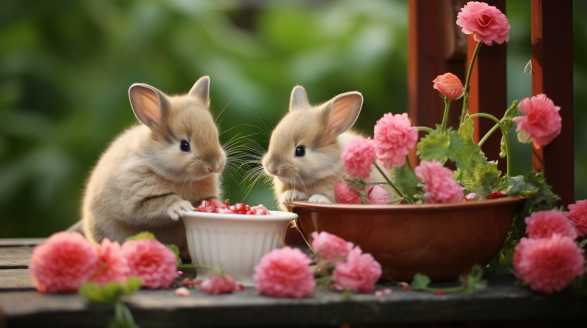
Do Rabbits Eat Geraniums
Introduction Do Rabbits eat Geraniums? Let’s find out in this comprehensive guide. I couldn’t help but wonder – what on earth could these fluffy creatures possibly find so alluring about my geraniums? Little did I know, this was just the beginning of a curious connection that would beckon me into the mysterious world of rabbits […]
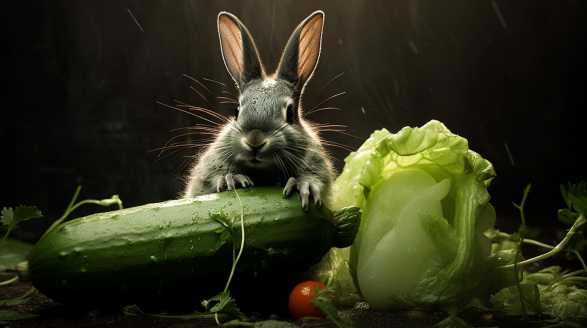
Can Rabbits Eat Cucumbers
Introduction Hey there, fellow bunny lovers! Are you ready to dive down the rabbit hole of cucumbers and their impact on our furry friends? Let’s find out, can rabbits eat cucumbers? Picture this: a world where your bunnies not only enjoy munching on their favorite treats but also stay hydrated, healthy, and have a smile […]
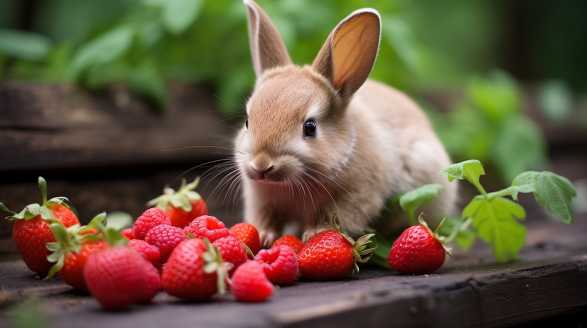
Can Rabbits Eat Strawberries
Introduction Are you ready to take your rabbit’s diet to a whole new level of excitement and tastiness? Well, get ready, because today we’re diving headfirst into the delightful world of strawberries for your furry friend! Let’s find out… can rabbits eat strawberries? Picture this: a fluffy, adorable bunny with those irresistible floppy ears and […]
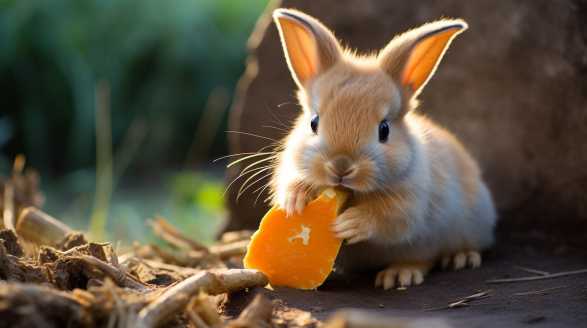
Can Rabbits Eat Sweet Potatoes
Introduction Can Rabbits eat sweet potatoes? Let’s find out.. I’ve always wondered if there’s more to our bunnies’ diet than just the usual hay and pellets. And boy, was I in for a surprise! I mean, who could resist the idea of providing their furry friend with a balanced and healthy diet? But here’s where […]
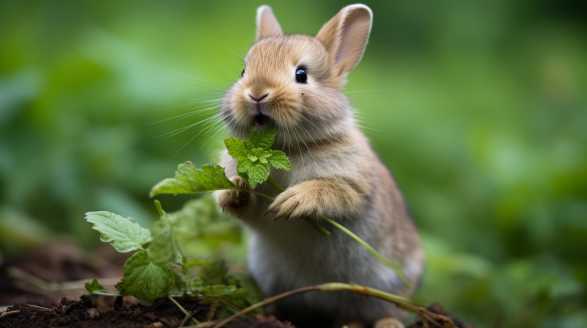
Can Rabbits Eat Mint
Introduction Can Rabbits eat mint? Find out in this comprehensive guide. Mint treats are not only incredibly tasty for rabbits, but they also offer numerous health benefits. So, get ready to pamper your bunnies and make their taste buds jump for joy with these amazing mint treat recipes! I don’t know about you, but whenever […]
